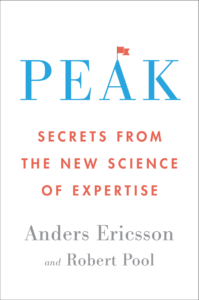I recall growing up and hearing the television commercial ads for the U.S. Army recite, “Be all you can be.” In my teens, I had lofty aspirations and really believed that I could not only be the best that I could be, but that I could be the best in the world. Eventually reality grounded me a bit and while I still inspire to excel, it’s tempered by the over education, career management, and even at times, some complacency—yuck!
Don’t get me wrong, I love my career and am proud to work with some of the smartest and most decent people I’ve ever met. But in moments of self-reflection, I still ponder if I am the best that I can be or if the youthful Pollyanna was just that. If you ever had similar thoughts, I have good news for you.
Recent studies by Anders Ericsson, PhD, and highlighted within the co-authored book with Robert Pool, Peak—Secrets from the New Science of Expertise (Houghton Mifflin Hartcourt 2016), scientifically break through common misbeliefs about our abilities to grow and develop; regardless of your stage in life. Like many myths, there’s a kernel of truth there, but there’s also significant opportunities for all of us.
Myth #1: Your development is limited by predefined ability.
For most professions, this is definitely a myth. The book outlines dozens of examples of people who have learned to become world experts in diverse fields. Truth is that we can, with the right practice, grow to develop pretty much any skill we want to develop.
There are very few exceptions. I’m 5’7”… chances are that I’ll never be a center for professional basketball team. But in general, it doesn’t mean that I can’t be a world-class athlete, chess player, or scientist. Be careful not to make this exception the universal truth, you can become almost anything you want to be.
Myth #2: Enough practice makes you better.
Partially truth, and that’s really the crux of the book. What Dr. Ericsson has discovered is that deliberate practice, characterized by focusing on tasks beyond your current level of competence and comfort, guided by a coach and eventually self-correcting to a gold standard, can make you an expert in just about any field you devote yourself to. What is false is that simply repetitive practice, doing the same task over and over again, will lead to very little incremental improvement.
Myth #3: You’re a better learner early in your childhood.
Practice literally changes parts of your brain. There are a few skills, for example deliberate piano practice, that increase the white matter in your brain at a greater and faster rate than as an adult. However, neuro-scientific studies have recently proved the vast elasticity and adaptability of our brains, even within the elderly.
Reading the research gave me hope. Inside of me there’s still that teenage kid who aspires to a continual pursuit to greatness. The new research dispels commonly held beliefs and challenges all of us face to reach higher, to be all that we can be.






